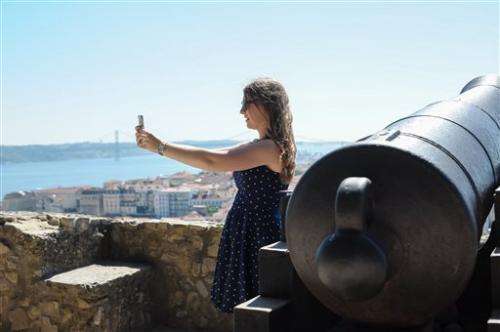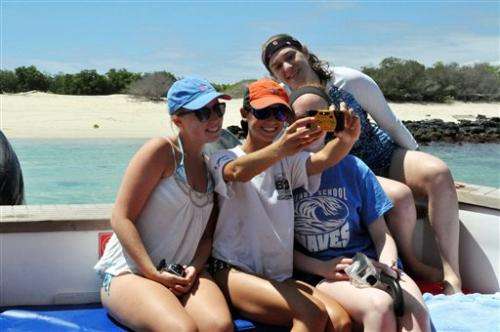Teens love vacation selfies; adults, not so much

(AP)—Jacquie Whitt's trip to the Galapagos with a group of teenagers was memorable not just for the scenery and wildlife, but also for the way the kids preserved their memories. It was, said Whitt, a "selfie fest."
For this generation, "digital devices are now part of the interpretive experience," said Whitt, co-founder of Adios Adventure Travel.
Indeed, many parents love seeing their kids taking selfies and posting to social media when they travel. It shows "they are engaged and excited about where they are and what they are doing," said Susan Austin, a photographer and Iowa mom. "To some, it might be bragging, but I think it's more about a way today's teens connect with and feel part of a group."
But some adults think there's a downside to vacation selfies. They see them as narcissistic distractions that can detract from the travel experience. And they point to controversial examples—like a smiling selfie from Auschwitz posted to Twitter—as proof of the potential for poor judgment when young travelers use social media.
In addition, when traveling teens spend time taking selfies, "they're so busy documenting, I wonder whether they're actually experiencing it," said Peg Streep, who writes about psychology and millennials. "What should be an experience of learning and growth instead just says, 'Look at me.' It's a narcissistic moment that's really about getting likes."
Streep pointed to a study by Linda Henkel of Fairfield University in Connecticut that found museum visitors remember more about what they've seen if they don't take photos of the objects they're viewing. That suggests that any type of picture-taking can take "you out of the moment of the experience and shifts your attention."

Another concern is practical. A real-time selfie from a far-off place tells the world you're not home. Leora Halpern Lanz, of Long Island, New York, loves it when her three kids take vacation selfies because it's their way "of validating where they were." But they're not allowed to post images until the trip is over: "I don't need their friends or friends of friends knowing the house is empty."
Lanz says the widely criticized Auschwitz selfie also shows "the risks of kids posting on social media" when they don't know what's appropriate.
Breanna Mitchell, the young woman who took the smiling Auschwitz selfie, received death threats and messages urging her to kill herself after the image went viral. In a video interview with TakePart Live, Mitchell said the selfie was misinterpreted. She'd studied World War II history with her father and they'd planned to visit historic sites together, but he died before they could make the trip.
Her selfie from the grounds of the concentration camp was her way of saying, "I finally made it here. I finally got where me and my daddy had always said we were going to go," she told TakePart Live. Looking back now on the selfie, she says, "I just went so wrong with that."
Still, most travel selfies are innocent and purely celebratory—as well as being a way for teens to keep in touch with peers. Taylor Garcia, 17, who traveled to Texas this summer on a family road trip from Oklahoma, says selfies are a fun way to remember places like Disney, SeaWorld and the Caribbean, but she also takes them "because I want to show my friends what I'm doing."
Her mom, Melissa Garcia, who posts her own family trip photos on her blog, ConsumerQueen.com, encourages the selfies. "It's a great way to preserve memories," she said, adding that other families have contacted her after seeing the photos to get advice for their trips.
Austin's daughter Abigail, 18, who shared selfies from a trip to Portugal, doesn't see the point of posting travel pictures without familiar faces in them. She wants a photo that shows, "Hey, I'm having fun! And I like seeing them of other people, too."
But at least one tour company, Tauck, has a written policy discouraging digital devices. For Tauck's Bridges program, which specializes in multi-generational family trips, guests are asked to "turn off and stow their smart phones, tablets and other portable electronic devices during shared group time."
Tauck spokesman Tom Armstrong says the company understands that digital devices can help teens pass the time during long car rides, flights or other downtime, "and we have no issue with that." But "when the tour director is giving commentary, or during museum visits, we think that our younger guests will actually get much more out of their trip if they're engaged in the experience and not distracted."
The bottom line, says Whitt: "Like all new emerging technology, the devices can be fun and wholesome, entertainment for all ages, or misused."
© 2014 The Associated Press. All rights reserved.




















